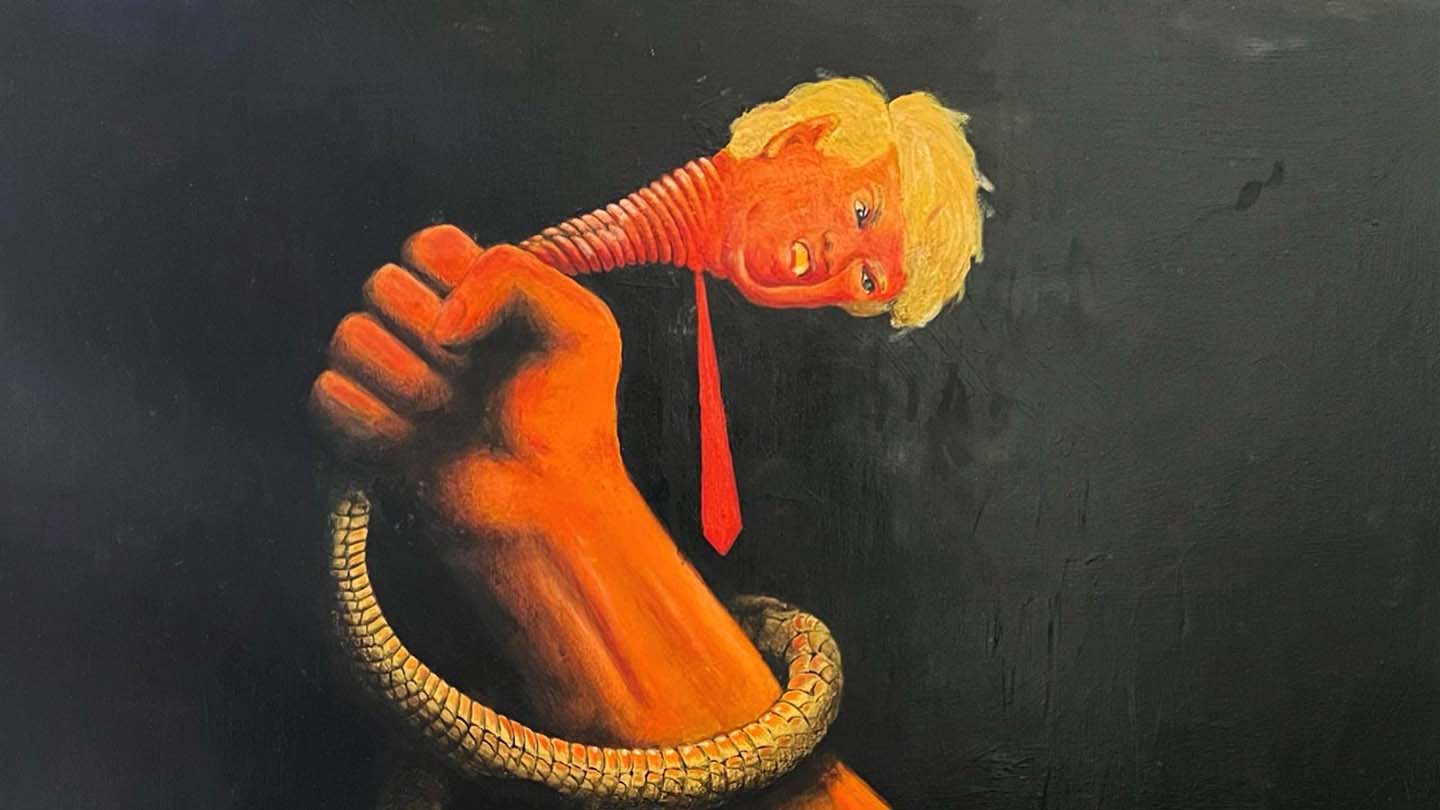Students at the University of Florida Passed a Historic Pledge for a Green New Deal
UF is the first and only public university whose student government has given a direct mandate for a Green New Deal. Here’s what happens next.
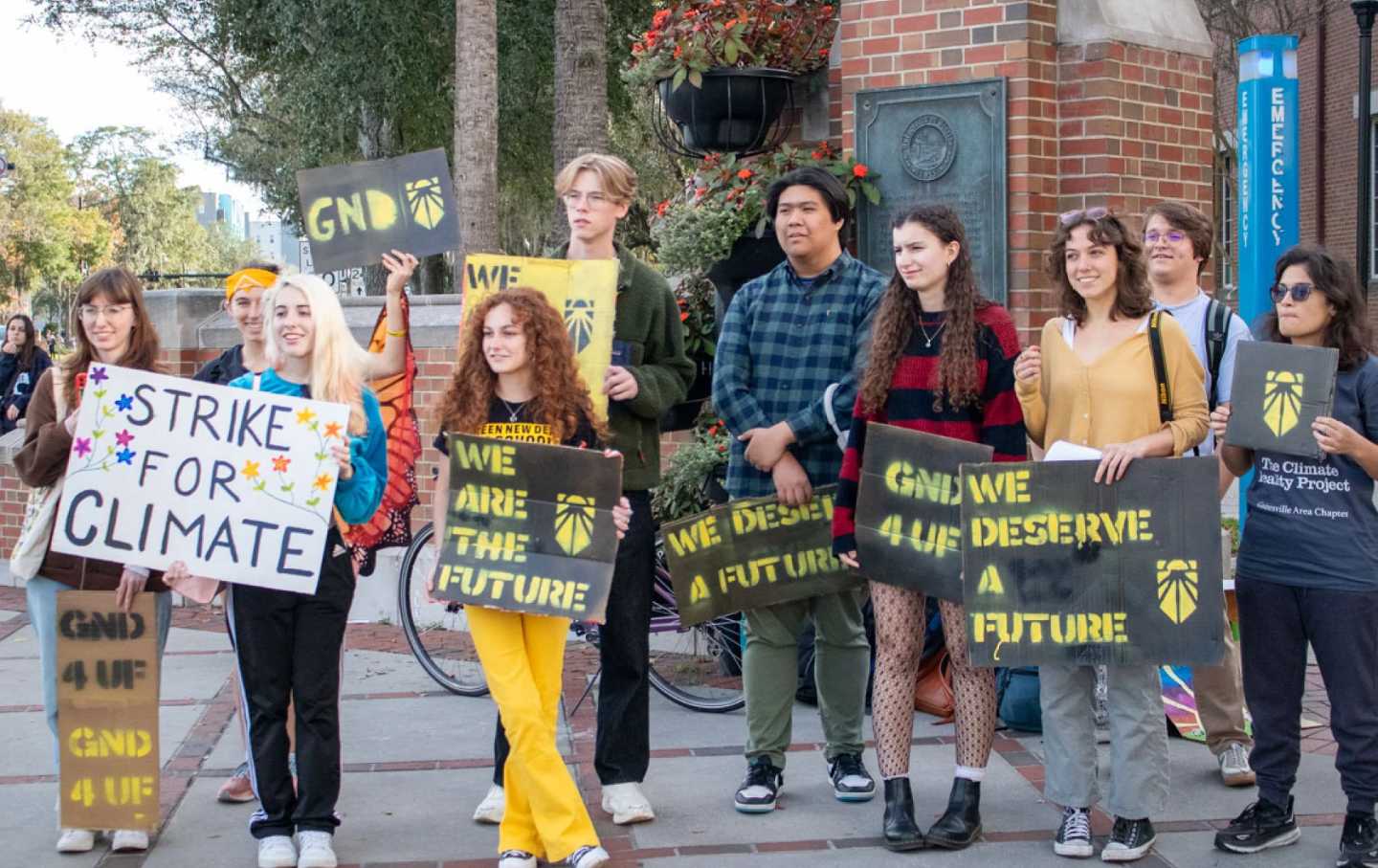
An event by the Green New Deal for UF Coalition on the University of Florida campus.
(Green New Deal for UF Coalition)On February 20, the student government of one of the largest universities in the United States unanimously passed a first-of-its-kind Green New Deal resolution, calling for sweeping on-campus decarbonization, complete divestment from the fossil fuel industry, and restorative justice for marginalized communities most affected by the climate crisis.
You might assume that this happened at one of the recognizably liberal-minded Ivy League schools in the Northeast, or perhaps within the climate-oriented University of California system. You would be wrong.
The resolution was passed at the University of Florida, one of the prime targets of Governor Ron DeSantis’s hostile takeover of higher education, where we successfully lobbied 100 elected student senators to call for a Green New Deal. In doing so, we made history. UF has become the first and only public university whose student government has given a direct mandate for a Green New Deal.
Our five-volume resolution outlines a comprehensive policy platform for climate sustainability at the university, which was drafted with input from students, faculty, and impacted communities with the goal of eventual adoption by UF.
Volume one demands the implementation of the Office of Sustainability’s updated Climate Action Plan 2.0, which would enact UF’s rapid transition to carbon neutrality through a wide array of measures that would decrease emissions and increase resource efficiency. Volume two directs UF administration to increase transparency surrounding its financial ties to the fossil fuel industry, which certainly exist yet are not disclosed publicly. Volume three calls for complete divestment from fossil fuel companies and other exploitative industries. Volume four demands the prohibition of UF faculty and research teams from accepting financial contributions from the fossil fuel industry to fund their research. And Volume five centers on including the voices of historically marginalized and Indigenous communities in executing climate mitigation measures to ensure a just transition.
In August of 2023, our freshmen year, the two of us met for breakfast in Gainesville. We had been inspired by the news that NYU would entirely divest from fossil fuels and were puzzled by the fact that similar organizing hadn’t begun in Florida, which is among the states most impacted by the climate crisis. Although UF was once a pioneer in climate advocacy, launching one of the first climate action plans in 2006, the new university administration led by former senator Ben Sasse, a Republican, has failed to adopt the updated Climate Action Plan 2.0 drafted by our Office of Sustainability two years ago.
Some may doubt that this resolution could have a consequential role on climate policy, but the student government at UF is unique in the power it wields within the university itself and across the wider city of Gainesville. The UF Student Senate allocated $23 million in discretionary funding for the 2023–24 school year; a similar amount is expected next year. This budget gives the UF student government free rein to invest in sustainable retrofitting of campus facilities and services. In addition, the student body president (who also sponsored the resolution) has voting power on UF’s Board of Trustees and can give input over the university’s fiscal policy.
The student government’s decision was felt well outside of UF itself. In the days following the passage, the county of Alachua’s commission endorsed our effort by penning a letter that asked university administration to adopt key planks of the Green New Deal for UF. Students at other universities nationwide like the University of North Carolina–Chapel Hill, Florida State University, Florida Atlantic University, and more have responded by organizing GND campaigns on their own campuses.
This development is not just another notch for the growing climate movement to put under its belt; it also unambiguously bears out existing polling data regarding the Green New Deal’s overwhelming popularity with young people. For example, Data for Progress recently found that support for the Green New Deal among those 45 and younger stands at 69 percent.
UF is one of the largest public universities in the country, with just over 60,000 enrolled students and an exceptionally diverse student body—demographically, economically, and educationally. Our fight was led not by a niche collection of environmental studies majors but by a broad coalition of ordinary students who simply want a livable future. The Green New Deal for UF coalition includes a dozen student organizations, including environmental groups, advocacy organizations, community service clubs, and established cultural associations like UF’s Pride Student Union.
Our path forward is clear, but it will not be easy. A recent presentation of the resolution to the Board of Trustees was met with thunderous applause by students, faculty, and community members who took time out of their day to show up in support of the Green New Deal for UF, but this support was not reciprocated by the trustees themselves. Our university’s supreme governing authority is made up of individuals who have collectively donated more than a million dollars to a PAC that supports climate deniers like Ron Desantis. And unlike other universities where students have successfully won concessions from their administrations, we can not take for granted that our leaders even recognize climate change as a serious problem.
Fortunately, the Green New Deal for UF is not in the hands of one person or authority—like the board of trustees—but of llseveral decision-makers in various positions within the university that have jurisdiction over specific volumes of the resolutions. These would include many vice presidents within President Sasse’s cabinet, many of whom have been in their positions since long before Sasse and may not necessarily subscribe to his conservative view on an issue so thoroughly advocated by the scientific community at UF and beyond.
Other legislative bodies like the UF Faculty Senate offer additional avenues to pressure the administration. We are currently working with several faculty senators to pass a companion resolution, which would further cement the GND for UF as a proposal with salience across the university. Evidently, our approach involves individual campaigns to force movement from these leaders one approval at a time.
Our clean research campaign, for example, involves securing pledges from individual professors to refuse financing from the fossil fuel industry to fund their research. In this way, we will force the industry to disentangle from UF’s research apparatus without needing an official ban from the vice president of research. Naturally, our first 10 pledges have come from within UF’s sustainability studies and climate science programs, but we intend to extend this request to all UF faculty members.
Popular
“swipe left below to view more authors”Swipe →Our multipronged strategy, which aims to win important policy concessions by applying pressure on every gear of our university’s vast bureaucracy, is designed to combat structural climate apathy, especially within an institution firmly under the guise of culture war politics.
However, the most important revelation from the passage of a GND for UF resolution is that youth activism has not been extinguished by Governor DeSantis’s crackdown. If anything, we have proved that his policies only serve to reinvigorate college organizers leading the fight for progressive policy issues while other organizations abandon our state. Whether in conventionally blue states or red states, the march toward climate justice will continue.
Thank you for reading The Nation!
We hope you enjoyed the story you just read, just one of the many incisive, deeply-reported articles we publish daily. Now more than ever, we need fearless journalism that shifts the needle on important issues, uncovers malfeasance and corruption, and uplifts voices and perspectives that often go unheard in mainstream media.
Throughout this critical election year and a time of media austerity and renewed campus activism and rising labor organizing, independent journalism that gets to the heart of the matter is more critical than ever before. Donate right now and help us hold the powerful accountable, shine a light on issues that would otherwise be swept under the rug, and build a more just and equitable future.
For nearly 160 years, The Nation has stood for truth, justice, and moral clarity. As a reader-supported publication, we are not beholden to the whims of advertisers or a corporate owner. But it does take financial resources to report on stories that may take weeks or months to properly investigate, thoroughly edit and fact-check articles, and get our stories into the hands of readers.
Donate today and stand with us for a better future. Thank you for being a supporter of independent journalism.
Thank you for your generosity.
More from The Nation

MTA Bus Drivers Don’t Work for the Cops MTA Bus Drivers Don’t Work for the Cops
The six bus drivers who walked off the job rather than transport protesters slowed the city’s mass-arrest machine by sticking to their union-negotiated contract.
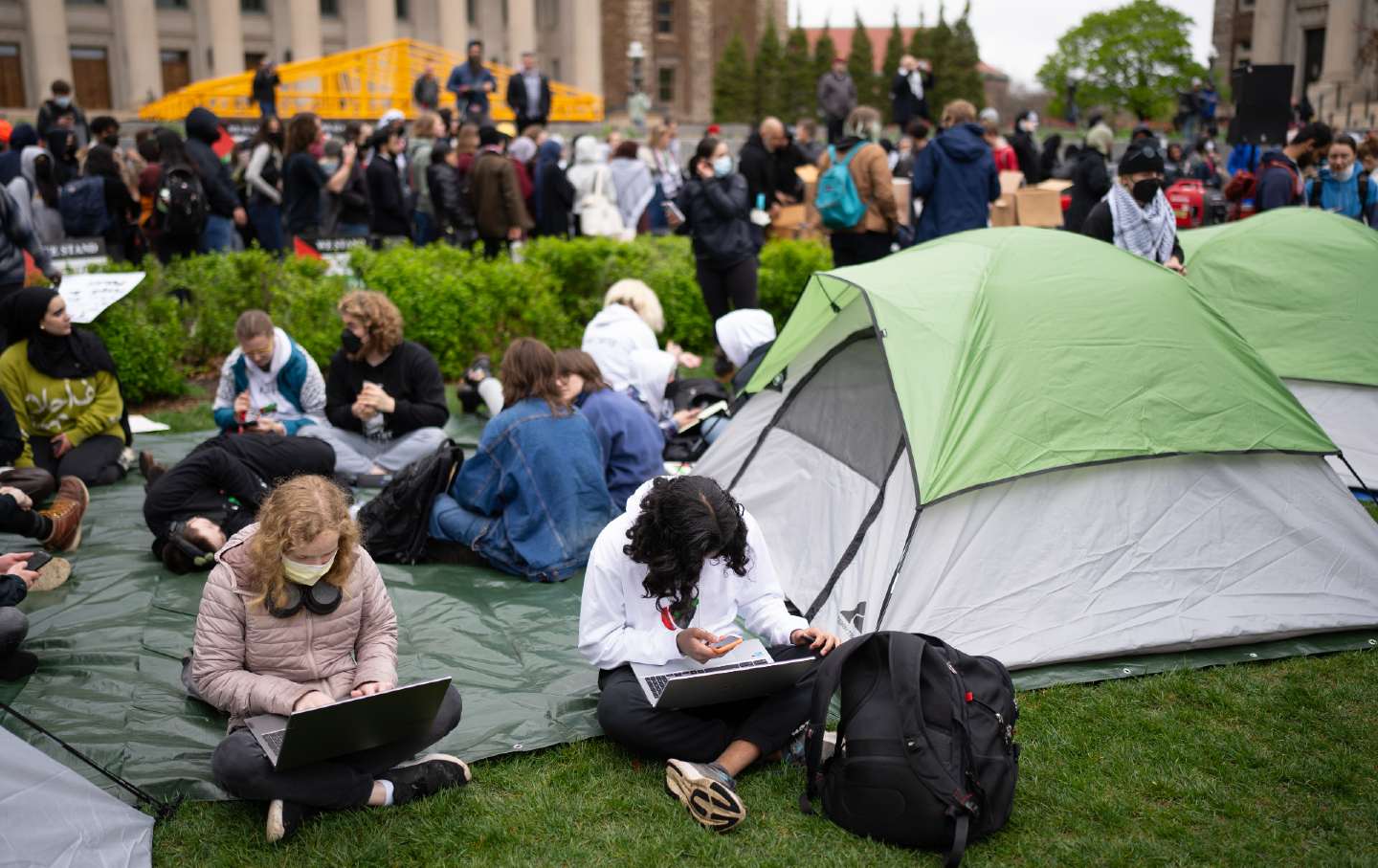
The Abolitionist Roots of Anti-War Encampments The Abolitionist Roots of Anti-War Encampments
From Minneapolis to Manhattan, the encampments now spreading across college campuses are built on the same principles as abolitionist spaces like George Floyd Square.
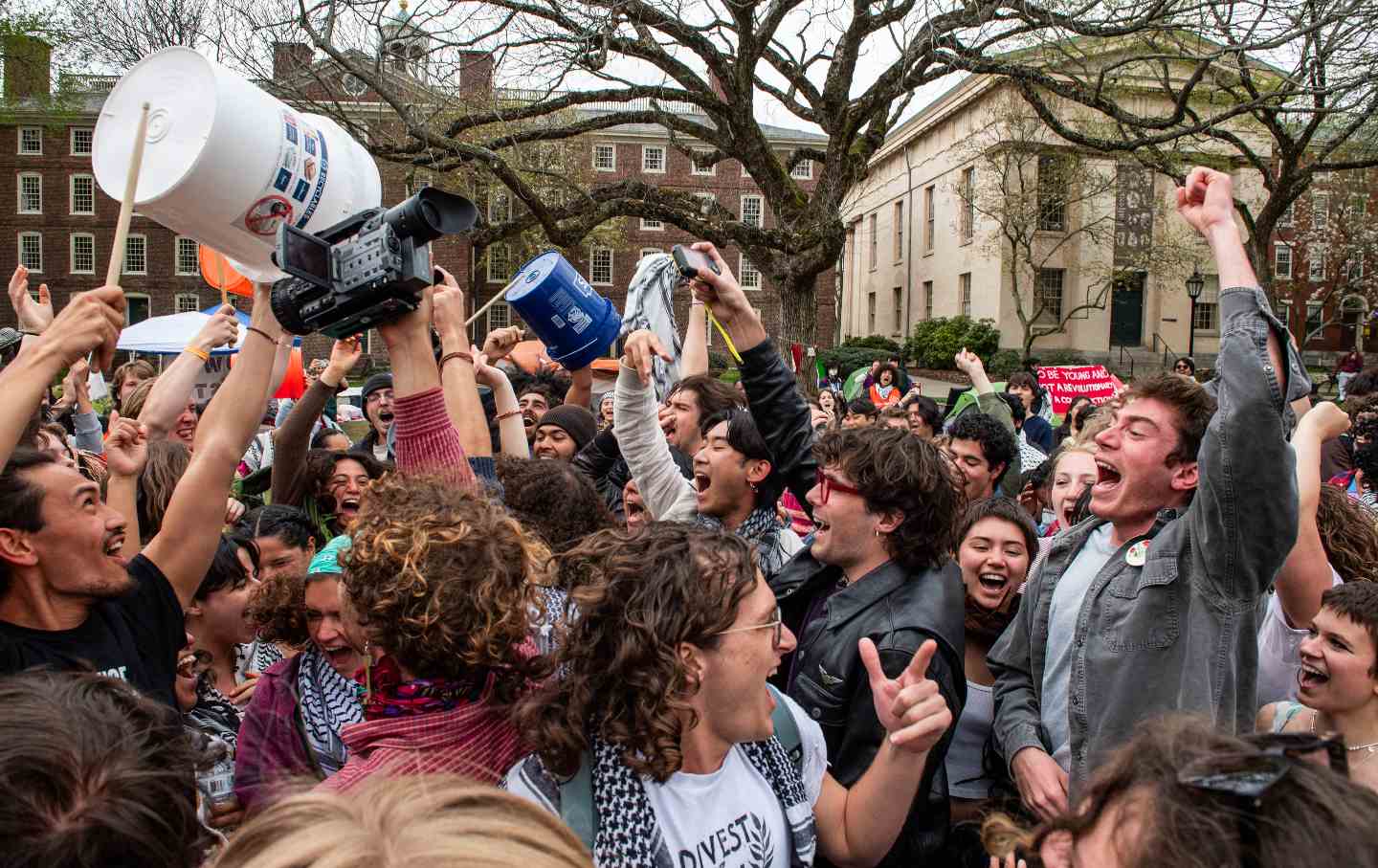
Students at Brown Just Secured a Vote on Divestment. What Happens Next? Students at Brown Just Secured a Vote on Divestment. What Happens Next?
On April 30, protesters disbanded their encampment when the university pledged to vote on divestment from companies affiliated with Israel. This shows a different way of doing thi...
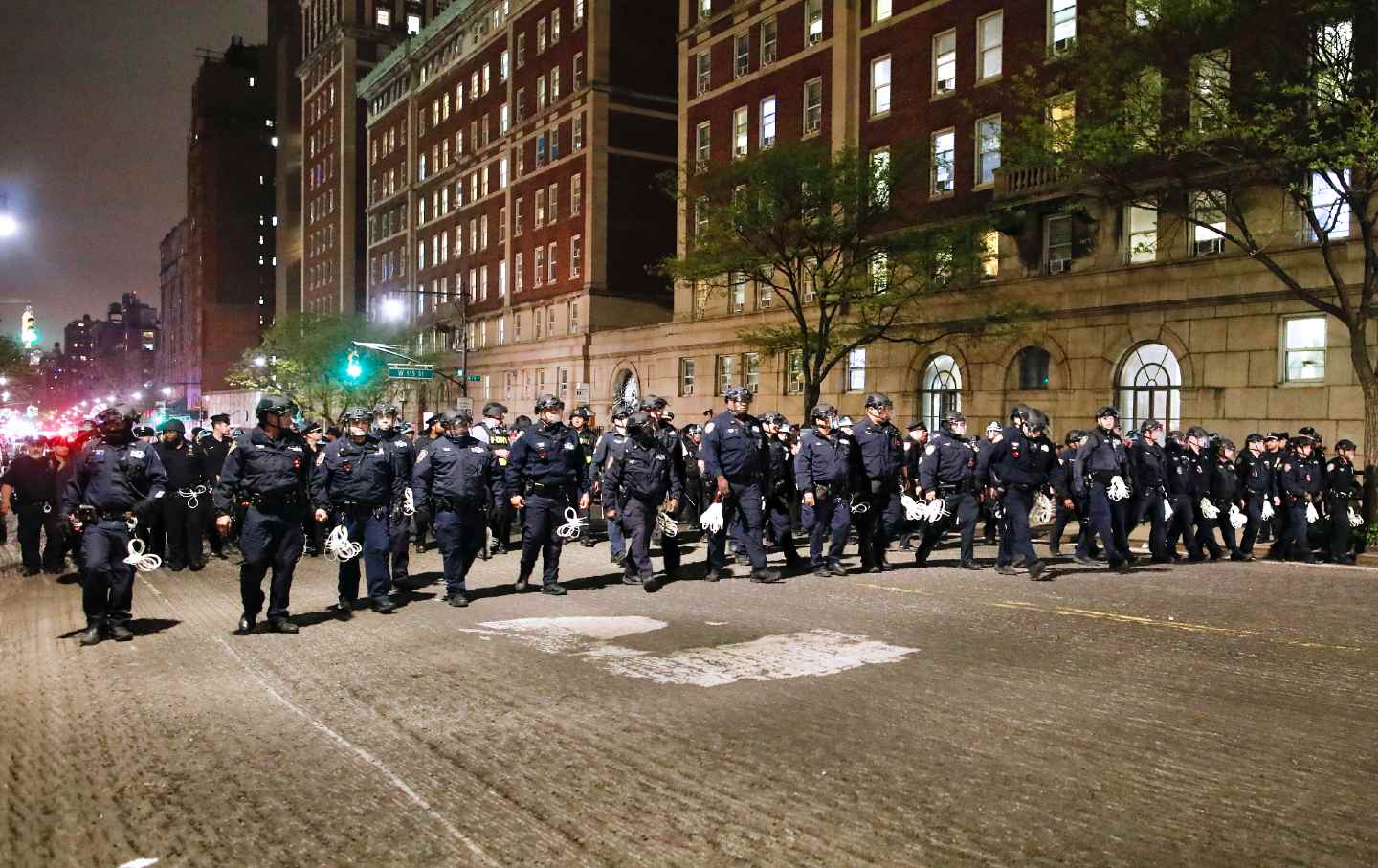
This Is How Power Protects Itself This Is How Power Protects Itself
The decision to sic the police on peaceful protesters is evidence that people in charge are panicking. They’re terrified of the strength of the movement for Palestine.

